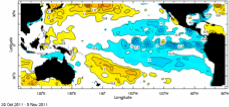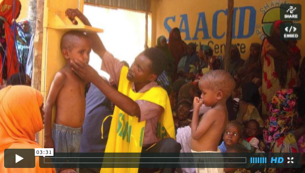If you're having trouble seeing international characters or other parts of this html page, click here to view online.

By providing timely and tailored climate information, climate services can help society limit the economic, ecological and social damages caused by climate-related disasters, and take advantage of opportunities provided by favorable conditions. The IRI and its partners recently held the first International Conference on Climate Services. The key outcome of the conference was the creation of a Climate Services Partnership, an informal alliance of climate information providers, users and others who want to advance the state of climate services around the world.
Read more.
Research In Context: IRI scientists discuss East Africa Drought
Climate and public-health expert Madeleine Thomson discusses the immediate and inter-generational health challenges East African societies face because of prolonged malnutrition caused by the famine. See these, and the rest of our videos about the crisis in the Horn of Africa on our multimedia page.
Follow us on Twitter! ![]() @climatesociety
@climatesociety
Welcome Back, La Niña

UPCOMING EVENTS AND SEMINARS
Nov. 17th: IRI Seminar at Lamont Campus: Climate, Forecast and Impacts Briefing. Our monthly meeting during which we unveil the latest global and regional forecasts, as well as discuss climate-related events around the world. view
Nov. 17th: MA Program In Climate And Society Information Session. view
IRI IN THE NEWS
International conference on how to make better use of information related to climate change concludes in New York. (National Public Radio transcript). view
Columbia Partners for Training Course on Minimizing Impacts of Global Environmental Change. (Association of Schools of Public Health). view
Green bra made in green factory shoots Lankan to fame. (The Sunday Times, Sri Lanka). view
Weather Journal Extra: Here’s Your New York Winter Outlook. (The Wall Street Journal). view
CURRENT SEASONAL RAINFALL FORECAST

The International Research Institute for Climate and Society was established as a cooperative agreement between
the U.S. National Oceanic and Atmospheric Administration's Climate Program Office and Columbia University.
It is part of The Earth Institute, Columbia University.
